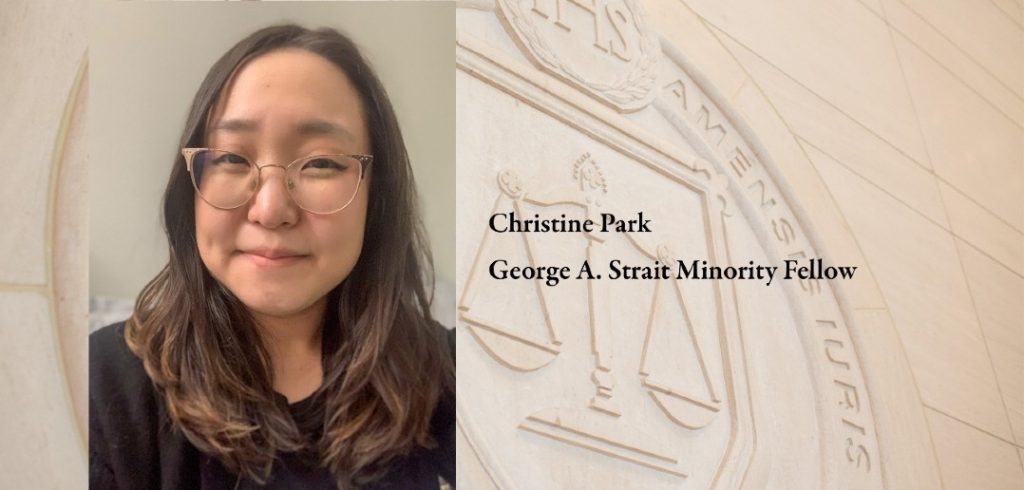Fordham Law’s Maloney Law Library is hosting its first-ever George A. Strait Minority Fellow this spring semester. The George A. Strait Minority Fellowship—offered through the American Association of Law Libraries—is designed to provide students from underrepresented groups with a unique opportunity to obtain meaningful and practical law library experience.
This year’s Strait Minority Fellow Christine Park, who will graduate from Rutgers University in May with a master’s degree in information science, chose Fordham Law out of 45 academic institutions across the country for her fellowship.
Some factors that made Fordham Law an attractive place for Park to study included its New York City location and being involved in an active library with various types of programming and teaching responsibilities. The Maloney Law Library is also fully-staffed at the moment with a number of reference librarians available to help students and faculty alike. Fordham Law librarians also teach classes, such as first-year legal research and upper-level advanced legal research classes that are graded and for credit.
While Park is completing her fellowship remotely from her home in Georgia, she says she’s thrilled to be working virtually with a New York law school. “I really wanted to be back in New York and, while the other New York schools are great, I found that Fordham seemed to really fit what I wanted to do,” Park said. “When I looked at Fordham Law’s website, there were a lot of programs and services that the library was involved in, and I just felt I would be able to learn a lot from the librarians here.
Park added, “I also feel like there aren’t as many opportunities to teach while in school, so I’m really excited about what I’m learning right now and what I’m going to learn throughout the fellowship.”
Kelly Leong, head of reference at the Maloney Law Library, explained that the majority of academic law librarians usually have a J.D. and a master’s in library science, which is a standard requirement. “Every extra degree someone is required to have is a barrier to entry for underrepresented groups and first-generation students,” Leong said. “Personally, I think it’s important that we participate in fellowships like this and make sure we’re giving people that already are facing barriers an opportunity to really get such experience.”
Fordham Law had only been part of the host list for less than a year when Park contacted the library during the summer of 2020.
“When I was finishing up library school, I benefited from an internship at Duke University,” Leong noted. “I really like to pay it forward in that way, too, and I saw this as a really great opportunity for us to assist librarians from underrepresented groups get experience in the library setting.”
Since mid-January, Park has been working on a large-scale, semester-long faculty research project with Adjunct Professor Janet Kearney; virtually visiting all upper-level advanced legal research classes; staffing the virtual reference desk and offering assistance to faculty and students; and maintaining Fordham Law’s social justice research guide. Leong says Park will also guest lecture in a Fordham Law class later this semester.
“It’s giving Christine an opportunity to observe how we teach legal research and law practice technology, and she’s also meeting weekly with our instructional services librarian, Alyson Drake, to develop an understanding of pedagogy and how to teach a class,” Leong noted.
Park is looking to publish some scholarship during the remainder of her time at Fordham Law, including a co-authored article with Law Library Director Todd Melnick.
“I’m just really glad my intuition was right,” Park said. “My experience so far has been really great, and I feel confident having chosen Fordham for my fellowship.”

